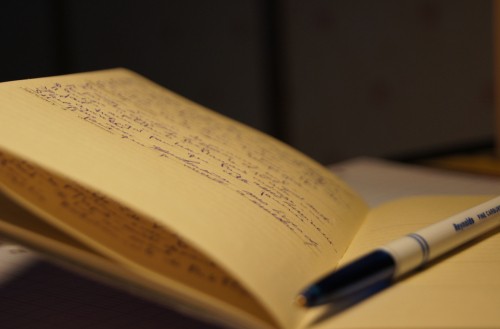Image: Diary (Photo: KévinV.Pxl, Flickr).
Just a few months ago, when the sheer scale of my current project was beginning to overwhelm me, I began to keep a research diary.
I had set out to examine why, after two decades of international intervention and aid, armed groups were not only as prevalent in the DRC as they had ever been, but were proliferating. The question I was trying to answer was admittedly a broad one – what is it that we’ve missed about armed groups? Researching this topic revealed more questions than answers.
In the early stages the focus of my research changed almost weekly; each new discovery revealed new significant themes. But, having finally decided upon the focus – the dynamics that drive armed-group violence – I found a plethora of tangentially relevant issues which I would have loved to have probed more deeply. I couldn’t, of course, because I needed to focus on the task in hand.
Similarly, I came across gaps in related bodies of literature, potential comparative case studies and interesting people to collaborate with. These would have all been interesting large-scale projects in their own right, but they were also distractions that led me down what the urban dictionary calls a ‘Wiki-hole’ of wasted hours as I pursued information online about issues beyond my research focus.
As I struggled to maintain my focus, our team’s communications support officer suggested that I could record my tangential ideas in a research diary. This would at least give me somewhere to park them, useful or not – and, in any case, as time went by and I reviewed my diary entries, I might well find that not all my unfocused ideas had been dead-end moments of procrastination.
So, when I wondered whether exorbitant UN salaries in DRC might provide negative incentives for peacekeepers, writing a diary entry about it helped me overcome the urge to laboriously follow up on UN pay scales, which could have seen me disappear down the wiki-hole for days.
The diary helped me file away ideas so that I could focus on my current research. But it also helped me realise how much time I spend thinking about my research, even when I’m reading for pleasure. For example, I made a note about how in John Buntin’s L.A. Noir, I was struck by the dynamics he describes between the LAPD and the LA gangs, and how this echoed the evidence I was gathering about state and armed gang interaction in the DRC.
Then there was the day I read an essay by Howard Jacobson about the opening line from Kafka’s The Trial: ‘Someone must have been telling lies about Joseph K…’. Yet Jacobson comes up with an interesting observation – nowhere in the story is it confirmed that anyone had been telling lies. For me, this prompted a train of thought about rumour and assumption – not all rumours are true, but not all rumours are lies either. In the DRC, it was crucial to remember this and it has since fed into the way I’ve handled my interview data.
The diary allows me to write freely, for myself, recording what interests (or enrages) me, and it’s not too time-consuming because I’m released from self-censoring worries about political correctness or literary polish. Yet it has already proved a very useful source of data for an autoethnography of my research experiences, both remotely and in the field, in the eastern DRC, on the use of crowdsourcing in conflict-affected environments.
I kept field diaries while I was in the DRC but it was in my research diary, kept quite separately, that I found I had a good record of all the difficulties I’d faced getting there. The obstacles I had to overcome to set up the crowdsourcing technology, the problems with the project (and my reaction to them as they unfolded) – all this information was to hand, along with my reflections on the implications for knowledge production in conflict-affected states. Only now do I realise how valuable recording all this has been for my research.
With hindsight, I can offer the following advice to anyone considering keeping this kind of diary.
- Discipline yourself to write, daily if possible – the entry need not be lengthy, but just a few sentences will help overcome any fear of writing.
- Keep it manageable – limit yourself to one reflection a day.
- Regularly review your entries (weekly is good, with revisits once every few months), otherwise they become a collection of insights that are as lost to you as if you had never written them down.
- Keep a contents page to make review quicker – a few trigger words that help you remember what each entry was about.
- Not all the thoughts you record will be winners. Some lead nowhere, and that’s normal.
In a credit-obsessed academic culture it’s easy to dismiss a research diary as having little impact or REF-value. But for me, at least, it has become a valuable tool that illuminates my research process and has prevented me from becoming overwhelmed by messy data.










